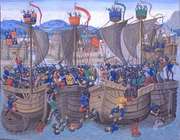Georges Bernanos, (born Feb. 20, 1888, Paris—died July 5, 1948, Neuilly-sur-Seine, Fr.), novelist and polemical writer whose masterpiece, The Diary of a Country Priest, established him as one of the most original and independent Roman Catholic writers of his time.

Bernanos began life as a Royalist journalist and later worked as an inspector for an insurance company. Like his predecessor, the French Catholic writer Léon Bloy, Bernanos was a visionary for whom the supernatural world was never far away. He was also a man of humour and humanity who abhorred materialism and compromise with evil. His vehement sincerity is seen in his political pamphlets La Grande Peur des bien-pensants, a polemic on the materialism of the middle classes (1931; “The Great Fear of Right-Thinking People”), and Les Grands Cimetières sous la lune (1938; A Diary of My Times, 1938), a fierce attack on Fascist excesses during the Spanish Civil War and on the church dignitaries who supported them.
As a novelist he made his theme the struggle between the forces of good and evil for the soul of man, a conflict particularly exemplified in his studies of priests. His characters, representing extremes of human behaviour from saintliness to utter depravity, are powerfully imagined and realistically drawn.
Bernanos’ first novel was Sous le soleil de Satan (1926; The Star of Satan, 1939; Under the Sun of Satan, 1949), partly based on the experiences of the Curé d’Ars. In 1936 Bernanos published Journal d’un curé de campagne (The Diary of a Country Priest, 1937), a story of a young priest’s war against sin. It was made into a motion picture by the French director Robert Bresson in 1951. Other notable works were La Joie (1929; Joy, 1946), Nouvelle Histoire de Mouchette (1937; Mouchette, 1966), and Monsieur Ouine (1943; The Open Mind, 1945).
Political events troubled Bernanos increasingly. In July 1938 he went into self-imposed exile with his wife and six children and began an unsuccessful farming venture in Brazil. He felt acutely what he regarded as the moral degradation of the Munich Agreement (“Scandale de la vérité,” 1939; “Scandal of the Truth”). In June 1940 he gave his support to his former classmate Gen. Charles de Gaulle. His broadcast messages and his Lettre aux Anglais (1942; Plea for Liberty, 1944) influenced his compatriots during World War II. A return to France in 1945 brought disillusionment with his country’s lack of spiritual renewal, and he lived thereafter in Tunis until he returned to France suffering from his final illness. Shortly before his death Bernanos completed Dialogue des Carmélites, a film script dealing with 16 nuns martyred during the French Revolution. An opera by Francis Poulenc was based on this work.
Learn More in these related Britannica articles:
-
 French literature: Politics subordinate to other concerns: Mauriac, Bernanos, and othersFew novels were in fact untouched by the political challenge, but many were more concerned with other preoccupations. The Surrealists explored the romance of the modern city. Aragon’s
French literature: Politics subordinate to other concerns: Mauriac, Bernanos, and othersFew novels were in fact untouched by the political challenge, but many were more concerned with other preoccupations. The Surrealists explored the romance of the modern city. Aragon’sLe Paysan de Paris (1926;Paris Peasant ), an innovative collage, was followed by Breton’s… -
The Diary of a Country Priest
…a Country Priest , novel by Georges Bernanos, published in French asJournal d’un curé de campagne in 1936.… -
Dialogues des Carmélites>Georges Bernanos, published posthumously in French as a drama in 1949 and translated as
The Fearless Heart andThe Carmelites . InDialogues des Carmélites , Bernanos examined the religious themes of innocence, sacrifice, and death. Based on Gertrud von Le Fort’s novelDie Letzte am Schafott … -
Dialogues des CarmélitesDialogues des Carmélites, screenplay by Georges Bernanos, published posthumously in French as a drama in 1949 and translated as The Fearless Heart and The Carmelites. In Dialogues des Carmélites, Bernanos examined the religious themes of innocence, sacrifice, and death. Based on Gertrud von Le…
-
Major Rulers of FranceDuring its long history, France has gone through numerous types of government. Under the Fifth Republic, France’s current system, the head of state is the president, who is elected by direct universal suffrage. The table provides a list of the major rulers of…
More About Georges Bernanos
3 references found in Britannica articlesAssorted References
- "Dialogues des Carmélites"
- “Diary of a Country Priest, The”
- French literature








